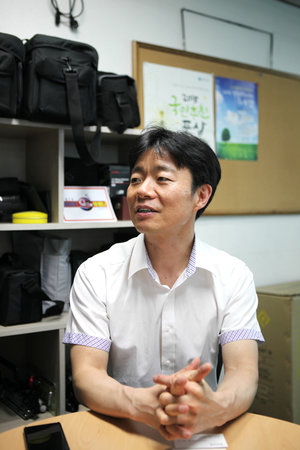 Lee Kwang Baek of Unification Media Group talks to Gonggam News. Image: Gonggam News |
“Steps toward reunification of the Korean
Peninsula are becoming a trend, regardless of individuals’ thoughts on it. We
cannot easily confirm whether the reunification will be a springboard or a
calamity. But if a civil society is established within North Korea it can effect major domestic change, shattering the authoritarian regime to spur unification, bringing about major opportunities for the Korean Peninsula to leap
forward.”
These hopes are the cornerstone of Lee Kwang Baek’s brainchild, Unification Media Group [UMG], the first
non-governmental unification broadcaster on the Korean Peninsula. Unification Media
Group is a consortium created by Radio Free Chosun [RFC] and Open Radio for
North Korea [ONK], shortwave radio stations targeting North Korea; The Daily
NK, an internet periodical reporting on all aspects of North Korea; and OTV, an
NGO-based internet television channel. Consolidating resources alleviated some
of the financial difficulties besetting each of the groups and increase
efficiency.
UMG now produces two new hours of content
for transmission daily. “Through inconceivable violence, terror, and
surveillance, North Korea has completely forestalled the formation of a civil
society, Lee stated in an interview with South Korean media outlet Gonggam News. “Our objective is to foster a civil society–the seeds of democracy– in North Korea.”
UMG is planning to expand its network of
patrons through its “UMG 100 donors club,” who donate time and/or make financial
commitments to bolster UMG’s efforts.
“For now, it is imperative that we attain a
medium wave frequency [AM], “ Lee explained. “In the long run, our objective is
to increase the listeners of our radio in North Korea from the current
estimation of 2% up to 5% or more.”
This interview has been edited for clarity and brevity.
-A lot of people are really curious about
what UMG is doing specifically.
As the name suggests, we strive for
unification above all else. We feel that it is paramount to know what North
Koreans want, what kind of future they envision for themselves and their
nation, as well as providing them with radio broadcasts and news from the
outside world. The ultimate goal is to enable citizens of both Koreas to
communicate with each other and prepare for the era of reunification.
Based on our best estimates, there are 10
million adults out of 25 million people in North Korea. If UMG can reach 1 million
of those adults, a civil society can burst forth and spur resident-driven
change in North Korea.
To attain those numbers, however, we need
more powerful signal than our current wave through which we transmit these
broadcasts.
We emphasize the word ‘citizen’ when it
comes to our mission, because the whole thing is non-governmental. It’s not the
government airing to North Korean citizens—it’s South Korean citizens doing
this of their own volition, fueled by a sense of duty and desperateness to connect
and communicate with the people of North Korea.
– UMG has set a goal of making 1 million ‘media citizens.’ Who does ‘media citizens’ refer to?
The term “human rights” is a completely
alien concept to North Korean residents. We believe that the true owners of any
state are its citizens. In North Korea, however, the egregious authoritarian
regime systematically deprives its people of their most basic rights as human
beings.
It doesn’t require complicated reasoning.
One qualifies as a citizen simply by thinking, “If we are the owners of the
state, we need to be free.”
UMG is striving to plant this thought in
the minds of North Korean residents and see it grow into a cornerstone for
North Korea’s transformation into a freer, reformed, and open society. In this
way, North and South together can engage in discussion on eventually
communicate with South Korea to step toward reunification. Such a notion is
what we want to invoke in the listeners. Our primary goal is to make free
citizens in North Korea.
-Who are the main donors currently
supporting UMG?
Mostly people with an existing interest in
North Korea. This includes human rights activists, regular citizens propelled
to help after learning more about the grave realities of North Korea, and North
Korean defectors. There are some students and elders who have worked in the
Ministry of Unification or other roles to lay groundwork for unification. Each
and every one of these individuals supports this organization under the belief
that a unified Korean Peninsula is common thread of hope weaving the Korean
people together.
– What are your plans to encourage more
funding or participation?
We’ve been focused on programming content
and our consortium’s system but plan to devote at least half of our time in the
future to hosting various events that will inform South Korean citizens of the
realities of North Korea. UMG also seeks to construct meaningful, informed
broadcasts programs aligning with the realities of North Korea while conveying
the importance of reunification not only to South Korea but the broader international
community.
We’re also trying to engage as many people
as possible in the production of these programs–a broadcast built by all
citizens, if you will. In this way, not only will the North Korean people gain exposure to
invaluable information, but they can also experience a range of opinions and perspectives
via other people’s stories.




















